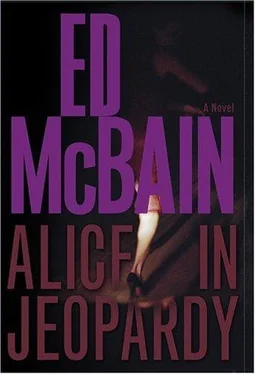She is afraid to go tell him.
“More coffee, miss?”
The waitress.
“No, thanks,” she says. “Just a check, please.”
What do we do now? she wonders.
Here we are with two hundred and fifty thousand dollars in perfectly fine-looking fake money we can wipe our asses with, and we’ve got two kids on our hands we won’t know what to do with now that—
“Here you go, miss.”
“Thank you,” she says, and takes the check, studies it. Six dollars and twenty cents for an orange juice, a cup of coffee, and a toasted English. At least on the Cape, they didn’t get you by the food. All they did was get you by the bills.
Smiling in spite of herself, she leaves a dollar tip on the table, and then walks to the cash register. She has a ten-dollar bill in her wallet, and she can just as easily pay for her breakfast with that. But suddenly…
I guess I should’ve cashed them someplace that doesn’t have a machine.
…the thought comes to her.
She opens her wallet and takes out another of the hundred-dollar bills.
“I’m sorry,” she tells the cashier. “I don’t have anything smaller.”
The cashier looks at the bill, snaps it sharply between both hands, the bill making a crisp little cracking sound, holds it up to the light to check the security strip, and then rings open her register and begins counting out change…
“Twenty-five, fifty, seven dollars,” she says, placing the coins on the countertop. And then three singles, “Eight, nine, ten.”
Watching her counting out more bills now.
“Twenty, forty, sixty, eighty, a hundred. Thank you, miss, have a nice day.”
Christine picks up the cash.
“You, too,” she says, and walks out of the restaurant and across the parking lot to where she left the red Taurus.
“Are you okay?” Charlie asks.
Alice looks at him across the breakfast table. It occurs to her that she has not sat at this table with anyone but her kids since Eddie’s death.
“Yes,” she says. “I’m okay, Charlie.”
“We’ll get them back, don’t worry,” he says.
There is something confident and comforting about his manner. It reminds her of Eddie’s self-assurance when first they met. But Eddie was very young then, and Charlie, of course, is fifty-six, though there is about him the vigor of a much younger man. She finds this strength reassuring, and realizes all at once that if she were facing a dozen hungry lions, she would rather have Charlie at her side than a hundred Wilbur Sloates.
“Something?” he says, and smiles.
“No,” she says, and returns the smile. “Nothing, Charlie.”
He hears a sound outside, and turns toward the living room windows. A car is pulling into the driveway. Alice has begun dreading the appearance of anyone here at the house. Every new appearance seems to bring her children closer to greater peril. A car door slams. A moment later, the front doorbell rings.
“Want me to get it?” Charlie asks.
But she is already on her way. She looks through the peephole, and then immediately unlocks the door and throws her arms open wide. The sisters embrace. Carol looks up into her face.
“Hey, honey,” she says.
“Hey,” Alice says.
She leads Carol in, locks the door behind them. Charlie is standing now, a napkin in one hand.
“Charlie,” she says, “this is my sister, Carol.”
“Never would’ve guessed,” Charlie says, and extends his free hand. “Damn if you don’t look like twins.”
“I’m a year older,” Carol says.
“Have you had breakfast, hon?”
“Could eat a bear.”
Alice goes to the stove, pours a cup of coffee for her sister, carries it to the table. She realizes she is smiling. For the first time since Wednesday afternoon, she is smiling. She cuts a few slices of rye bread, pops them into the microwave. Charlie is asking Carol how the trip down was. She’s telling him there was a lot of traffic, but it was moving fast. Alice carries the bread, a slab of butter, and a jar of raspberry jam to the table. Carol digs in.
“So what’s happening here?” she asks.
Alice suddenly hugs her close.
“Hey, what?” Carol asks. “What?”
Christine figures one of the malls is the best place to go. No need to go driving all over town, all the shops are in one location here. In a Barnes & Noble, she buys the two latest Nora Roberts novels, and pays for them with one of the hundred-dollar bills. The man behind the counter doesn’t even bother to check the bill’s security strip. He makes change for her, smiles, and looks up at the next customer in line.
At a Victoria’s Secret, she buys two Balconette push-up bras at $19.99 each, one in the black hydrangea, the other in the cheetah print, and a pair of low-rise thongs, both in the leopard print at $5.99 each, and a black lace garter belt at $7.99, for a total of $59.95 before tax. She hands the salesperson a hundred-dollar bill and then wanders over to look at the sleepwear collection, choosing a red sequin-lace baby-doll nightgown and carrying it back to the cash register.
“Can you add this to the bill?” she asks, and the salesperson smiles and says, “Of course, miss,” adding $29 to the earlier total, for a grand total of $88.95, plus tax, and then counts out the change without a whimper.
Christine wonders if it’s time to press her luck.
Dustin Garcia is not a crime reporter as such, and he is not familiar with any of the cops downtown at the Public Safety Building. When he stops at the reception desk in the main lobby, he merely asks for the detective who’s handling the Glendenning kidnapping, and waits while the uniformed officer behind the desk plugs into one of the extensions.
“Anyone up there handling a kidnapping?” the officer asks into the phone. He listens, looks across the desk at Garcia. “Who’d you say?” he asks.
“Glendenning. Alice Glendenning.”
“I mean you, ” the officer says. “Who’re you ?”
“Dustin Garcia, Cape October Trib. ”
“Dustin Garcia,” the officer says into the phone. “October Trib. ” He listens again. “Third floor,” he says, “Detective Sloate.”
Just as Christine steps off the escalator on the second floor of the mall, she finds an electronics store selling Sony, Hitachi, Samsung, and Philips television sets. She does not know how far she should go here, how much she should risk to test her theory. The salesman is a guy in his sixties, she guesses, another one of the bored retirees down here. He tries at first to sell her a Philips 34-inch digital wide-screen, which, at $2,800, happens to be the most expensive set in the store. She is reluctant to go that high, not because she doesn’t have that kind of money — she is still carrying almost five thou in hundreds in her bag — but only because she doesn’t want any eyebrows raised.
The salesman figures she’s a deadbeat, maybe because she’s black, maybe because she’s relatively young, who the hell knows or cares? He immediately switches to pitching the cheapest set he has in the store, a Samsung 27-inch that goes for $300.
“If you don’t need top-shelf features like a flat screen or picturein-picture,” he says, “this little beauty’ll give you good picture quality. And it has an excellent remote control, and V-chip parental control, do you have any children?”
Two, she almost says. Temporarily.
“I had something a bit more upscale in mind,” she says.
“Then how about this?” he asks, brightening, and shows her a 32-inch Sony Trinitron Wega that he says is on sale for a mere $1,800.
“This model earned more votes than any other HD-ready model,” he tells her. “It can auto-switch to enhanced mode when it detects wide-screen sources, and the pull-down circuitry improves the picture quality of film-based material.”
Читать дальше












